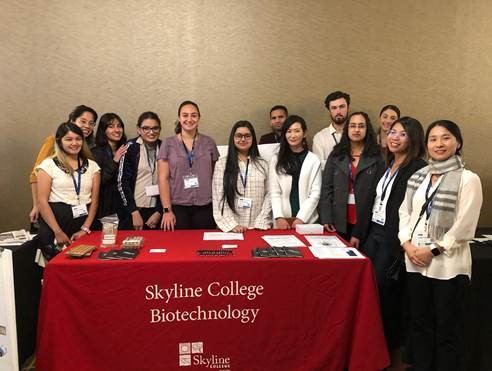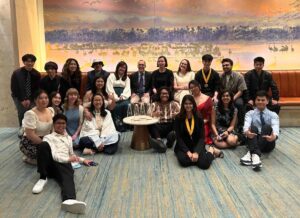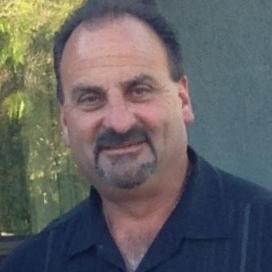 Skyline College’s biology and biotechnology students attended the 22nd Annual Chinese Bioscience Association (CBA) Conference titled “From Disruptive Innovations to Real-World Application” on October 12, 2019 held at Crown Plaza in Foster City. For many of the students, it was their first experience at a scientific conference. Student volunteers arrived as early as 7:45 a.m. to set up the college’s booth to ensure everything was perfect. Students took turns to man the ship and provided information about Skyline College’s Biotechnology Program, its degrees and certificates, as well as shared their experience as a Biology major. Many of the biotechnology students are also members of the West Coast Chapter of the Parenteral Drug Association (PDA) and handed out pamphlets.
Skyline College’s biology and biotechnology students attended the 22nd Annual Chinese Bioscience Association (CBA) Conference titled “From Disruptive Innovations to Real-World Application” on October 12, 2019 held at Crown Plaza in Foster City. For many of the students, it was their first experience at a scientific conference. Student volunteers arrived as early as 7:45 a.m. to set up the college’s booth to ensure everything was perfect. Students took turns to man the ship and provided information about Skyline College’s Biotechnology Program, its degrees and certificates, as well as shared their experience as a Biology major. Many of the biotechnology students are also members of the West Coast Chapter of the Parenteral Drug Association (PDA) and handed out pamphlets.
Dr. Jing Folsom and Dr. Nick Kapp gave an assignment to each of the students attending. They were encouraged to practice their networking skills by asking to get a selfie with a conference vendor or researcher. The conference lasted all day with multiple presenters. During breaks, students would either man the table and talk to scientists as they walked by or network.
The highlight of the conference was the interaction of computer technology with good old fashioned pharmaceutical medicines. Many of the talks at the CBA conference featured elite biotechnology companies presenting current projects and research on advanced pharmaceuticals for complex diseases such as Parkinson’s, non specific seizures, epilepsy, and Alzheimer’s.
Students were introduced to medical devices like a digital medicine that reminds the patient to take their medicine. The compliance data is sent to their physician to help improve medication outcomes. Patients who have seizures are often told to keep a personal diaries after they have a seizure. This is often problematic for epileptic patients. To assist, a watch and app developed by Empatica, Embrace Watch, was made to detect tonic clonic (a type of seizure) and notify caregivers. The device also keeps data on seizure occurrence and length to better report out to physicians. In all cases, the group observed implications for artificial intelligence use in assisting patients. Data collection would allow artificial intelligence to predict when the patient would likely have a seizure, sending signals to the brain to stop a seizure before it happens. This will replace using service dogs and cats to alert when a seizure will happen.
Another medication is called Proteus, an ingestible sensor hidden in prescription tablets that transmits signals to an online patch. The digital record of medication is stored in a cloud and with permission, health care providers can access when a patient takes their medication. The patch also measures daily activity and sleep quality. Proteus allows cancer patients to inform their doctors about their medication information without taking multiple trips to the doctor or invasive tests. Patients were successful in taking their medications on time due to the notification system provided by the app. This way the app maintains a log of the medication history and vitals, forwarding the information to healthcare providers directly. This eliminates the risk of losing “health diaries” and false verbal information from the patient. This way, patients are able to get better without the pressure of being told what to do from the doctors. The success of patients following their medication regimes in this way, surprised physicians in the study.
The conference was a great opportunity to engage with professionals in the biotechnology field as well as gain knowledge about innovative industrial machines such as cell counters and small particle analyzers. The conference also provided opportunities for students to look for internships, jobs, and mentors.
We look forward to going back to this conference again next year, with resumes in hand.
Article by Nick Kapp | Photo by Jing Folsom






